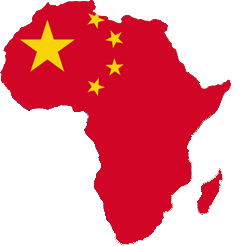The Chinese population was growing at an alarming rate and this made the authorities in 1978 to come up with the one child policy to stem the tide. The need to take care of the ever growing population must have made them think beyond China and do a critical review of their communist economic model. The collapse of the Soviet Union and the economic crisis in Cuba and North Korea must have been enough food for thought!
Africa became their sudden new bride and they moved in with swift ferocity. The beleaguered continent was fed up with the paternalistic relationship it had with Europe and America and desperately needed a breath of fresh air which the Chinese symbolised.
With a volume of $200 billion, they have displaced Uncle Sam as the continent’s largest trading partners. It is a well known fact that their ability to lift about 600 million of their countrymen out of the scourge of poverty can be traced to their trade with the continent which also indirectly accounts for the fact that it is the current fastest growing economy in the world. There are currently a million Chinese residents in Africa and the figure may grow exponentially.
China is Sudan’s largest economic partner and has access to 40% of its crude oil. They sell arms to the Nation as well and were accused of not intervening in the Darfur crisis because it may hurt their arm trade.
They were also accused of supplying Zimbabwe with jet fighters, vehicles and other military equipments. Worldwide criticism made them declare in 2007 that they were dropping all forms of assistance and only limiting it to humanitarian aid. In 2008, they told President Robert Mugabe to behave.
Congo holds half of the world’s cobalt reserves and has vast reserves of high-grade copper and tin. A ton of copper has risen from $1700 to $8000 presently which makes it a goldmine for them. The local residents complain that the foreign guests do not bother to mix with them – they feel a tinge of contempt and their activities hurt the local market. Blackberry phones can be purchased at a third of the market price. This trend of cheap Chinese goods is a continental one and who suffers? Of course it is the local industries as they cannot compete effectively. Nationalistic sentiments wouldn’t make Africans ditch cheaper goods for more expensive ones.
China has been accused of having lots of sweat shops and they have brought this to Africa. In Nigeria we can still recall the Chinese factory which locked its staff during working hours and a fire outbreak killed some of them. Field workers working without basic safety apparel is a norm and their wages are highly pitiable – starvation wages as a friend calls them. They have a trend of bringing in most of their workers from China thereby denying the much needed technological transfer to Africans.
The Republic of Niger is currently locked in a battle with them for better oil deals with them. An independent audit revealed bloated costs and unfair charges in a partnership agreement with the China National Petroleum Corporation. They are pressing for a fresh agreement as tens of millions of dollars has already been saved. The Minister of Oil in Chad shut down Chinese operations when they discovered they were massively dumping excess crude oil in ditches south of the capital, N’Djamena. In Gabon, the government withdrew a permit for an oil field from a subsidiary of the Chinese owned Sinopec.
It is tragic that Africa has always been at the receiving end from other continents. We had the Trans-Atlantic slave trade, the scramble for and partition of Africa which brought about colonialism, neo-colonialism or imperialism by the West and now its continuation by the Chinese. The hydra-headed monster of corruption has always made her leaders turn a blind eye to the atrocities committed by these foreigners in the name of foreign investment. While we commend the patriotic actions by the officials of Niger, Chad and Gabon who put their countries first and could have easily made a killing via corrupt deals with them, other leaders have to do more to ensure that these relationships are not one-sided.
We must have a long term agenda of economic independence of the continent. Issues of technological transfer, better working wages and conditions for workers, more use of locals for technical assignments have to be addressed. We remember the eternal words of Osaygefo Kwame Nkrumah who boldly declared that political independence without economic independence is a great misnomer. Political interference in the affairs of African States must never be tolerated no matter the circumstances. We have had enough from the West and it would be a monumental tragedy if Beijing becomes the novel Imperialists.
We need a new clone of Nelson Mandela in form of economic visionaries as the partnerships must be skewed on the long run to one of mutual relationships. It is high time Africa demanded a greater share of the world’s pie and this can only be done through a deep introspection of our innate strengths and channelling our human capital to its actualisation. No Foreigner will ever do what we cannot do for ourselves.
It is foolhardy to expect Africa to operate in isolation but it is more foolish to subtly allow a grab culture of her natural resources and its being a fertile ground for the dumping of excess goods which has the potential to perpetuate her economic dependence. Let us not forget the Malaysia tale when they came to freely obtain our palm kernels in the 1960’s only for them to sell them back to us in the 1990’s.
Sola is @ademiluyitony on Twitter



